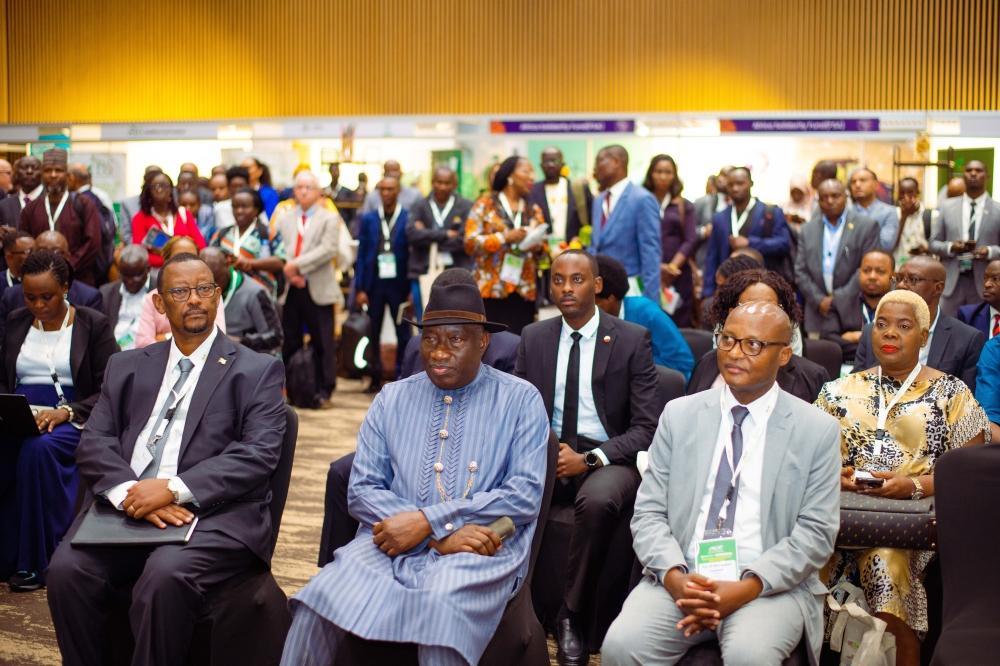Africa-Press – Rwanda. While Africa has made strides in agricultural technologies and innovation, most smallholder farmers— considered the backbone of the food system—still face major barriers to accessing these advancements, experts have said calling for efforts to address them.
They made the observation on June 9, during the second edition of the African Conference on Agricultural Technology (ACAT), being held through June 12 in Kigali.
From limited financing and outdated tools to a lack of scalable, farmer-focused technologies, they said that systemic issues continue to threaten food security and resilience in the face of climate change.
Through collaborative dialogue and farmer-centred innovation, ACAT 2025 aims to close these gaps—ensuring no farmer is left behind in Africa’s journey toward inclusive, technology-driven agricultural transformation.
Panelists engage in a discussion related to farmer-centric agricultural technologies and interventions, at the conference in Kigali. Photo by Emmanuel Ntirenganya
Bringing together stakeholders in the agri-food systems, including scientists, researchers, farmers, technology firms, and policy makers, it is being held under the theme “NextGen Ag-Tech Solutions for Africa’s Farmers.”
Rwanda’s Minister of Agriculture and Animal Resources, Mark Cyubahiro Bagabe, said that the different groups of stakeholders convening are collectively embracing the bold vision of changing the face of African agriculture through innovation, inclusivity and farmer-centric approaches.
The agriculture sector, he said, faces numerous challenges, including the impact of climate change, technological gaps, particularly the use of outdated tools across most of the value chains and appropriate storage facilities and limited access to finance, just to mention a few.
“These issues collectively hinder food security, nutrition and contribute to significant post-harvest losses. I firmly believe that ACAT has brought together a robust group of experts, each bringing valuable knowledge and solutions to address these pressing agricultural challenges across the African continent,” he stated.
“By centering our discussions on farmers, we aim to co-create, innovate in an inclusive way and provide sustainable solutions. Putting farmers’ needs and preferences first is more than just a buzzword; it represents a true paradigm shift. It means placing smallholder farmers — the often-overlooked backbone of our food systems, the unsung heroes of our food systems — at the centre of all our decisions and investments and innovations, is very key,” he said.
This approach calls for genuine attention to their challenges, respect for their traditional knowledge and wisdom and working together in developing solutions that empower them to enhance productivity and resilience.
Elizabeth Nsimadala, the president of the Eastern Africa Farmers Federation (EAFF), said that while there are many technologies so far, farmers’ access to the has been limited. She called for adequate investment in scaling it up.
“And when you look at most of the technologies, they are usually supported by grants; and these are two- or three-years grants. And after the end of these grants, then the project becomes a white elephant,” she said.
“So, I think it is important that we profile and package well models which are working and be able to put them at scale,” she suggested.
Giving an example, she said that there is no reason why a given country in Africa should be investing in cassava technologies or research when there are models that are already working in another.
Canisius Kanangire, the Executive Director of AATF, said that for over two decades, the organisation has coordinated the formation and implementation of public-private partnerships aimed at facilitating development and access to agricultural technologies that address production challenges, enhance yields, and contribute to the continent’s economic growth while enhancing community health and wealth.
He indicated that AATF and its partners are tackling productivity challenges exacerbated by climate change, pest and disease pressure, and inefficiencies in the agricultural value chain—including seed systems and enabling policy environments.
“Despite progress in research and technology development, the diffusion of these innovations to end-users, especially farmers, remains limited. Persistent bottlenecks are preventing the delivery of these innovations to market, which diminishes the return on investment in agricultural research and development and undermines the intended impact,” he said.
Addressing these challenges, he stated, requires deliberate action by high-level decision-makers and institutions across the continent to improve value chain optimisation and facilitate intra-African trade.
“This conference offers a timely opportunity to reflect on and build upon decades of effort aimed at facilitating access to, development of, and commercialisation of agricultural innovations that address multiple stressors faced by farmers—including climate change and pests and diseases,” he observed.
For More News And Analysis About Rwanda Follow Africa-Press






